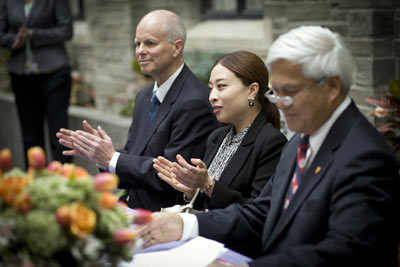Alumna and princess of Thailand champions women's rights
By Erica Rhodin

In her first visit to Cornell Law School since her graduation, Her Royal Highness Princess Bajrakitiyabha Mahidol of Thailand, LL.M. '02, J.S.D. '05, emphasized the importance of a broad perspective in studying and practicing law. She spoke at Myron Taylor Hall May 10; while on campus, she also witnessed the signing of a memorandum of understanding (MOU) to continue a scholarship to Cornell Law School and a scholarly exchange fund in her name.
A prosecutor and a diplomat, the princess practiced law at the Office of the Attorney General in Thailand until 2005; she now chairs the United Nations Commission on Crime Prevention and Criminal Justice (CCPCJ). Of her multifaceted professional background, she said, "I ask myself now, what am I exactly? A prosecutor? A criminal lawyer? A diplomat? The answer is everything all together. I say I am a hybrid."
The princess was exposed to an international environment at Cornell, she said, that enriched her life and informed her perspective on law. "I think the experience ... has really broadened my perspective. ... It showed me that law itself has many dimensions within it, because law, especially criminal law, has direct impact on human life, rights and liberty. Studying law is not only studying the rules of law but about studying the social, the philosophy and everything behind it as well."
As a prosecutor, the princess applied this insight to develop a "practical approach" to the practice of law. While a prosecutor must enforce the law, she said, it is also critical to understand cultural context and the root causes of crime, such as lack of education.
As a diplomat, the princess has focused on the plight of women prisoners and their children. She has been deeply involved in the Enhancing Life for Female Inmates Project, which provides rehabilitation, cultural reintegration and occupational training for inmates and their children, the "innocent lives that have to suffer from the criminal justice system," she said. Her advocacy efforts culminated in the adoption by the U.N. General Assembly of the "Bangkok Rules," international guidelines for the minimum treatment of prisoners that recognize the special needs of female inmates, she explained.
The princess has also championed women's rights generally, especially the elimination of violence against women. Thailand recently has adopted a law to combat this "hidden problem," she said, but making it effective requires heightened public awareness. "It is clearly not only an issue of the law. It is an issue of assisting the victims who have the strength to pursue the law or get [help] other alternative ways, such as counseling."
Since the princess has been chair of the CCPCJ, the commission has addressed diverse aspects of crime, including human trafficking, corruption, piracy and migration. Cooperation among those with different opinions, she said, is crucial to tackling these complex issues: "It has really enriched my experience that many people from different parts of the world have different opinions on things, but that if we all join together we can all make the world better."
The MOU the princess signed renews an agreement to fund the Bajrakitiyabha Scholarship to Cornell Law School's LL.M. program and the exchange of legal scholars between Thailand and Cornell Law School. The princess was accompanied by a delegation from the Thai Bar and the U.S. Royal Thai Embassy, including fellow Cornell Law alum Kittipong Kittayarak, LL.M. '83, permanent secretary of Thailand's Ministry of Justice.
Erica Rhodin '12 is a writer intern for the Cornell Chronicle.
Media Contact
Get Cornell news delivered right to your inbox.
Subscribe